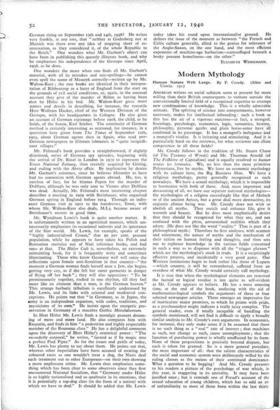Modern Mythology
AMERICAN writers on social subjects seem at present far more willing than their British counterparts to venture outside the
conventionally limited field of a recognised expertise to attempt new combinations of knowledge. This is a wholly admirable attitude. The splitting of science into compartments, however necessary, makes for intellectual inbreeding : such a book as this has the air of a vigorous outcross—in fact, a mongrel. Sociology, psychology, economics, logic, semantics, histbry, philosophy, personal quirks and plain horse-sense have all combined in its parentage. It has a mongrel's inelegance and a mongrel's vitality. It is irritating and stimulating. And it is particularly hard on the reviewer, for what reviewer can claim competence in all these fields?
Mr. Creedy follows in the tradition of Mr. Stuart Chase (of The Tyranny of Words) and Mr. Thurman Arnold (of. The Folklore of Capitalism) and is equally resolved to humer toutes les formules. We, no less than the most primitive Polynesians, live by myths. We have an economic mythology with its culture hero, the Big Business Man. We have a religious mythology, pretty generally recognised as Such
nowadays. We have a sexual mythology, which it is impossible
to harmonise with both of these. And, most important and devastating of all, we have our separate national mythologies—
the mythologies of a religion exceedingly like that of Moloch or of the ancient Aztecs, but a great deal more destructive, its orgiastic climax being war. Mr. Creedy does not wish to abolish all myths. They enrich and enhance life, give it warmth and beauty. But he does most emphatically desire that they should be recognised for what they are, and not confused with the plain, unvarnished realities which they adorn. (He does not like the word " reality." That is part of a philosophical myth.) Therefore he first analyses, with acumen and enjoyment, the nature of myths and the mechanism of their action on human feeling and thoughts, and then sets out to rephrase knowledge in the various fields concerned in such a way as to dispense with all the " trigger phrases " which are the mythologist's stock in trade. It is a surprisingly effective process, and incidentally a very good game. Our Western institutions begin to look rather like those of Laputa —which country, it will be remembered, suffered from an overdose of what Mr. Creedy would certainly call mythology. It is true that when the mythological elements are removed the factual or logical residue is not quite as self-evident as Mr. Creedy appears to believe. He has a most amusing time, at the end of the book, analysing with the aid of mathematico-logical symbols the arguments of three or four selected newspaper articles. There emerges an impressive list of inarticulate major premises, to which he points with pride, as a psychoanalyst might indicate a really juicy complex. The general reader, even if totally incapable of handling the symbols mentioned, will not find it difficult to apply a broadly similar analysis to Mr. Creedy's own arguments. In economics, for instance, they only make sense if it be assumed that there is no such thing as a " real " rate of interest ; that machines as such, not change as such, cause unemployment ; that the function of purchasing power is wholly unaffected by its form.
None of these propositions is precisely beyond dispute, but each is taken for granted. So is a more general postulate, the most important of all : that the salient characteristics of the social and economic system were deliberately willed by the ruling classes as the means of their continued dominance.
What a question to be begging! And Mr. Creedy presents
to his readers a picture of the psychology of war which, in this year, is staggering in its unreality. It may have been justified once ; but it reminds one of Freud's account of the sexual education of young children, which has so odd an air of unfamiliarity to most of those born within the last thirty
years or so. Mr. Creedy says that the war of 1914-18 bore out his contentions. There is small sign of the present one doing so.
His is not, in fact, a book to be accepted as a reliable outline of the social sciences. It is a spur, a challenge, a piece of magnificent cheek, not a treatise. It is as a challenge that Professor Malinowski praises it in his preface, for forcing the reader to " move along the lines of constructive thought." That quality is undeniable. It is unfortunate, however, that either in an effort to avoid "trigger phrases "—the illegitimate word-magic of the mythologist—or in sheer incompetence, Mr. Creed should have written his book in a style which, though Professor Malinowski praises it, the present reviewer
can only characterise as perfectly foul. HONOR CROOME.



































 Previous page
Previous page